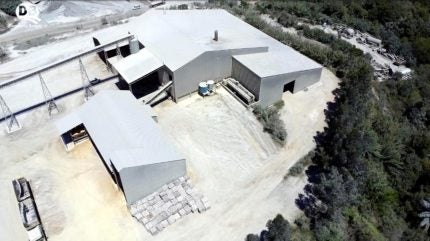
Aguia Resources’ 100%-owned Brazilian subsidiary Águia Fertilizantes has entered INTO a ten-year lease agreement with Brazilian company Dagoberto Barcelos to utilise its existing processing facility in Rio Grande do Sul, Brazil, to treat Pampafos ore.
This strategic move is aimed at enhancing Aguia’s phosphate production capabilities. Aguia also retains the option to extend the lease for a further ten years.
Under the terms of the lease, Aguia will pay an entry fee of 5m reais ($871,765), structured in six payments to align with the company’s cash flow strategy.
The initial payment of 120,000 reais is due eight days post-signing, with subsequent payments spread across the following five months.
From 1 August 2025, Aguia will incur a monthly lease fee of 163,200 reais.
Aguia will take operational control of the processing facility, which currently has a processing capacity of around 100,000 tonnes per annum (tpa) of phosphate.
Installing an extra hammer mill, a second drying unit, and minor system upgrades could boost annual production to 300,000tpa.
Production at the facility is projected to begin by the third quarter (Q3) of 2025, initially utilising Pampafos ore.
Aguia is fast-tracking exploration and development of the Mato Grande and Passo Feio deposits, which could potentially replace the Pampafos ore.
These deposits are located near the DB plant, with Mato Grande less than 3km away, and Passo Feio located 8km away.
Drilling and evaluation efforts at these sites are currently underway.
Aguia executive chair Warwick Grigor said: “Depending upon the speed
of market penetration, Aguia will look to expand production at the plant as early as the start of 2026. When I became chairman of Aguia I stated that our goal was to clear the way to commence production of phosphate in Brazil as soon as possible.
“I am pleased to report that we are now close to realising that goal with our eye on progressive expansion through one or more processing plants and with significantly less capex [capital expenditure] than previously expected. With Brazil largely dependent on phosphate imports, we are confident of carving out a meaningful market position in southern Brazil, the country’s preeminent agricultural region.
“We look forward to bringing on a second meaningful revenue stream this year, adding to our gold processing operations at the high-grade Santa Barbara project in Colombia which is advancing very favourably.”
Aguia anticipates earning A$150 to A$160 per tonne for its high-grade product.
The company is in talks with another processing facility in Caçapava do Sul to expand production from its fully owned phosphate projects.



